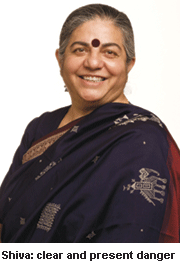Internationally acclaimed environmentalist Vandana Shiva delivered the 4th annual Henry Volken Memorial Lecture to a packed audience at the Indian Social Institute (ISI) in Bangalore on September 16 on the theme of ‘Global warming and climate change: ecological consequences for the poor countries and the possible responses’. The lecture was instituted by the Society of Jesus aka the Jesuits, who manage 155 schools and 31 colleges (including ISI) across India, to commemorate sociologist Henry Volken (1925-2000) who established the ISI in 1963.
 During the course of her two hour lecture Shiva squarely blamed big business and multinationals for global warming and environmental degrada-tion. “We are at a major watershed moment between corporations and societies,” she said. “Corporate and business polluters have stolen the air we breathe. And poor people are fed up of being made scapegoats for corporate schemes to make super profits by squeezing money out of peasants for seed royalties and water. Ultimately, the issue is corporate control over the means of life versus the celebration of a partnership between people and the Earth,” she said with characteristic forthrightness.
During the course of her two hour lecture Shiva squarely blamed big business and multinationals for global warming and environmental degrada-tion. “We are at a major watershed moment between corporations and societies,” she said. “Corporate and business polluters have stolen the air we breathe. And poor people are fed up of being made scapegoats for corporate schemes to make super profits by squeezing money out of peasants for seed royalties and water. Ultimately, the issue is corporate control over the means of life versus the celebration of a partnership between people and the Earth,” she said with characteristic forthrightness.
According to Shiva, global warming is a clear and present danger. The Himalayan glaciers are melting; monsoon rains around the country have become unpredictable; genetically modi-fied crops introduced by international corporations “like Monsanto” have plunged millions of Indian farmers into debt and forced 200,000 to commit suicide.
During her talk followed by an interactive session with the 150-plus audience, Shiva also took issue with nuclear power (“neither cheap nor clean”), biofuels (“costs more fossil fuel energy to produce than fossil fuel saved”) and genetic engineering (“no lie is bigger than the ‘fact’ that genetic engineering will be a solution to hunger”). The solutions to global warming and climate change according to Shiva are organic farming, water management, and a switch from rice, corn and wheat to traditional staples like millet, sorghum and coarse grains.
A physics graduate of Guelph University, Canada, with doctorates from the University of Western Ontario and Indian Institute of Science, and an MBA from IIM-Bangalore, Shiva is eminently qualified to debate environmental issues. The author of 17 books and founder of Navdanya, the country’s largest network of seed banks, organic producers and eco activists, she has had honours heaped thick upon her. Among them: the Alternative Nobel Prize, the Order of the Golden Ark, Earth Day international award, and recognition from the UN Global 500.
Currently Shiva and her organisation are working to secure a future not just for India’s marginalised poor but for people across the country and world-wide. “We are working to propagate non-violent, bio-diverse agriculture,” Shiva says. “To this end we have persuaded nearly half a million farmers across the country to switch to organic, earth-friendly and sustainable farming practices. And this number is multi-plying rapidly. It’s only a question of time before the great majority of Indian farmers begin to see we are talking sense.”
Food for thought!
David Wightman (Bangalore)